Organizations like Narcotics Anonymous follow the 12 steps of recovery to support their members as they navigate the addiction recovery journey. At Chapter 5 Recovery, we implement the spiritual principles of the 12 steps of NA in our treatment approach. We can also help people find NA meetings in Arizona following treatment.
We believe that by providing a spiritual foundation for our guests, we offer them the opportunity to achieve whole-health healing. We can help you get started at our treatment center in Arizona and connect with NA support as soon as today.
What Is Narcotics Anonymous (NA)?
Narcotics Anonymous (NA) is a support group program designed to help people recover from addiction to drugs and alcohol. The program was started by Jimmy Kinnon in the 1950s, following the same 12-step principles established by Alcoholics Anonymous (AA).
NA offers regular meetings around the globe. They’re often found in local community centers, churches, or at schools after hours. During these recovery support group meetings in Arizona, people can share their experiences, find encouragement, and build connections. The program follows a set of 12 guidelines. These emphasize personal responsibility, a higher power, and building a support network.
Despite the name, NA welcomes anyone struggling with addiction, regardless of the specific substance. The program centers around achieving and maintaining complete sobriety. It is a free, independent organization, but is often incorporated in various treatment facilities and programs.
The 12 Steps of NA Explained
The 12 Steps is a foundational program for Narcotics Anonymous (NA). Understanding each of these steps and their requirements is essential for finding success. Steps 1, 2, and 3 emphasize accepting powerlessness and finding hope:
- Step 1: Admit you have no control over your addiction and your life has become unmanageable. This is a crucial first step, acknowledging the hold addiction has and the need for change.
- Step 2: Believe in a higher power that can help you recover. This higher power can be God, a spiritual force, or something that gives your life meaning. It provides hope for a future beyond addiction.
- Step 3: Surrender your will and life to the care of your higher power. This signifies letting go and trusting in a force greater than yourself to guide your recovery.
Steps 4 and 5 involve taking responsibility for yourself and your addiction. In doing so, you can begin taking the steps you need to overcome your addiction and begin leading a better life. These steps include:
- Step 4: Take a fearless moral inventory of yourself. This involves deep self-reflection. You will identify your character defects and how they contributed to your addiction.
- Step 5: Admitting to your higher power, yourself, and another person the exact nature of your wrongs. This is about acknowledging your mistakes and taking responsibility for your actions.
Steps 6 and 7 instruct members on how to begin moving forward with their life and their recovery. In doing so, they can begin to leave their substance abuse in the past and start their healing:
- Step 6: Being entirely ready to have your higher power remove all your defects of character. Here, you express willingness to let go of negative traits that hinder your recovery.
- Step 7: Humbly ask your higher power to remove your shortcomings. This signifies relying on a higher power for strength and guidance in defeating your weaknesses.
Finally, steps 8, 9, 10, 11, and 12 instruct members how to live a recovered life. Getting sober is just a part of the recovery journey. Learning how to maintain that sobriety is a life-long commitment, as each of these steps addresses:
- Step 8: Make a list of all persons you have harmed and become willing to make amends to them all. This involves taking responsibility for the consequences of your addiction on others.
- Step 9: Make direct amends to such people wherever possible, except when doing so would injure them or others. This is about seeking forgiveness and repairing broken relationships.
- Step 10: Continue to take personal inventory and promptly admit your wrongs. This is about staying vigilant and honest about your recovery journey.
- Step 11: Sought to improve your conscious contact with your higher power as you understood Him, praying only for knowledge of His will for you and the power to carry that out. This emphasizes developing a spiritual connection and seeking guidance for a better life.
- Step 12: Having had a spiritual awakening as the result of these Steps, you tried to carry this message to others, and to practice these principles in all your affairs. This involves helping others in recovery and living by the principles you learned in the program.
Reach Out for Help With Addiction
Are you struggling with addiction?
Royal Life Centers at Chapter 5 is here to help you recover. Because we care.
Tips for Completing All 12 Steps of NA
NA is a powerful tool for recovery, but its 12-step philosophy can also feel daunting. That is why we have compiled a comprehensive list of tips to help you approach and complete all 12 steps:
- Take it one step at a time: You do not need to rush through the steps. Each step has its own significance and requires reflection and personal work.
- Seek support: NA meetings are a cornerstone of the program. Active participation can help you find others who understand your struggles and can offer support.
- Find a sponsor: A sponsor is a more experienced member who can guide you through the steps. They can answer your questions and provide encouragement.
- Be honest with yourself: The steps call for deep self-reflection. Don’t be afraid to be honest about your addiction and its impact on your life.
- Focus on personal growth: The steps aren’t only about stopping drug use. They are about developing a healthier and happier way of life.
By following these tips and remembering to take the program at your own pace, your recovery can be successful. We are here to support you throughout every step of your recovery journey and guide you through each of the 12 steps.
What Are Some Alternatives to 12-Step Programs?
There are several effective alternatives to 12-step programs for addiction recovery. Depending on your individual needs and preferences, you may be interested in programs such as:
- Self-management and Recovery Training (SMART Recovery): This is a science-based recovery program. It emphasizes self-empowerment and teaches skills to manage thoughts, urges, and behaviors.
- Secular Organizations for Sobriety (SOS): Similar to SMART, SOS offers a secular recovery support system. It maintains a focus on self-help and personal responsibility in the recovery process.
- LifeRing Secular Recovery: Another secular option, LifeRing emphasizes building a “toolbox” of recovery skills. It promotes a harm reduction philosophy, prioritizing safety when moving into recovery.
- Women for Sobriety: This program specifically addresses the needs of women in recovery. It focuses on underlying issues like trauma or relationship problems.
These are just a few of the recovery programs available to those struggling with addiction. Each of these can be helpful on your recovery journey. To learn more about these programs and more traditional treatment options, reach out to Chapter 5 Recovery today.
Drug Addiction Treatment in Arizona
Chapter 5 Recovery offers a variety of traditional and holistic treatment options, including NA’s 12-step recovery approach. Our dual diagnosis and behavioral therapy programs can help you get better from any kind of substance use disorders. When you seek treatment with us, you can expect to participate in several levels of care, including:
- Medical Detox
- Residential Inpatient
- Partial Hospitalization Program (PHP)
- Intensive Outpatient (IOP)
- Outpatient (OP)
- Therapies
- Nutritional Counseling
- Case Management
Struggling with drug and alcohol abuse is a terrible place to find yourself. NA meetings can help. If you are ready to begin your recovery journey, a rehab program is just a phone call away. We are available 24/7 to answer your treatment questions about dual diagnosis treatment, drug or alcohol detox, and addiction recovery. Addiction therapy does work. Call us for insurance verification and to get started on the path to sobriety with one of our programs for substance abuse as soon as today! Treatment programs and alcohol rehab can help if you just make the call for help.
- Roadmap to Long-Term Sobriety: Making a Relapse Prevention Plan - July 24, 2024
- The Dangers of Mixing the Zombie Drugs Fentanyl and Xylazine - May 6, 2024
- The 12 Steps of NA Explained and How to Complete Them - April 22, 2024













